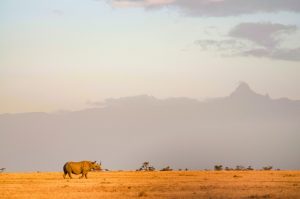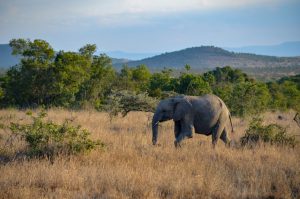On World Humanitarian Day, the UK Space Agency announced £3.4 million funding from their International Partnership Programme for ten pioneering UK space projects that will tackle development problems worldwide.
The project, known as Sat4Wildlife in Kenya, has been selected as one of these ten projects. Led by Fauna & Flora International and WILDLABS, the project is a partnership between the Satellite Applications Catapult, the Zoological Society of London, the Arribada Initiative and Ol Pejeta Conservancy. It will use satellite-enabled technologies and build infrastructure to support collaboration between conservationists and technology experts to help halt the loss of Kenya’s biodiversity, reduce degradation of habitats and conserve local livelihoods which depend on them.

Credit: Nicolas Tubbs / FFI
Kenya has lost 68% of its wildlife in the last 40 years. This project will harness satellite-enabled technologies and build infrastructure to support collaboration between conservationists and technology experts to help halt the loss of Kenya’s biodiversity, reduce degradation of habitats and conserve local livelihoods which depend on them.
The project will create an online platform and marketplace which will bring together technology providers and conservationists to create an ecosystem of accessible, effective tools for conservation, for example the development of an open source, land-based animal tracking system to mitigate human-wildlife conflict. These technologies, along with ongoing capacity building and education in Kenya, will form the basis of a physical Centre of Excellence within the Ol Pejeta Conservancy.
Joanna Elliott, Senior Conservation Director – Cross-cutting Programmes, Fauna & Flora International said:
“Technology has an increasingly important part to play in protecting and restoring critical habitats around the world, and it is very exciting to be moving forward on this project. The conservation challenges in Kenya are numerous, from habitat loss to human wildlife conflict, and innovative sensing and monitoring technologies in particular will boost the capacity of conservationists in the country to tackle threats to people and wildlife. Strengthening these technology applications in Kenya is just the first step. Our vision is for satellite-enabled conservation solutions to scale to the global level in order to tackle pervasive environmental threats globally.”
The schemes are among 10 new cutting-edge projects involving UK companies helping tackle global development problems – from the spread of malaria to human trafficking. The UK Space Agency’s International Partnership Programme (IPP) has provided £3.4 million funding in total, including £400,000 for the WILDLABS and FFI led project.
Heather Garrick, Sustainable Development Lead, Satellite Applications Catapult at the Harwell Space Cluster, said:
“We are very excited that the UK Space Agency is supporting our vision to create Sat4Wildlife: an ecosystem of geospatial intelligence tools for the conservation of wildlife and habitats in Kenya. This is an amazing milestone for the work that Fauna & Flora International, WILDLABS, The Zoological Society of London, Arribada Initiative, Ol Pejeta Conservancy, and the Satellite Applications Catapult have been doing collectively in this area over the past few years.
“With the UK Space Agency’s support, we will strongly embed space technology within conservation efforts, starting in Kenya and eventually on a global scale. This project will not only harness and scale the latest space and conservation technologies, but it will also unlock the international partnerships necessary to safeguard our world’s biodiversity, increase our climate change resilience and advance the Global Goals for Sustainable Development.”

Credit: Stephanie O’Donnell / FFI
Science Minister Amanda Solloway said:
“From flooding and climate change, around the world people continue to be affected by crises that are having a profound impact on their countries’ economies and their lives.
“These 10 new projects have the potential to provide solutions to the world’s biggest development problems by using the latest and most high-tech space technologies such as satellites, and help improve millions of people’s lives in developing countries.”
This announcement comes as a new report is published, evaluating the impact of existing IPP projects.
IPP, a £30 million a year programme, has already grant-funded 33 projects in 44 countries across Africa, Asia-Pacific and Latin America and built partnerships between 120 space-enabled data organisations and 147 international partners in developing countries. These projects are designed to meet UN Sustainable Development Goals (UN SDGs) such as support for precision agriculture, early warning systems for disaster prediction, maritime safety, and disease forecasting.
The Programme has so far generated £279 million in Gross Value Added for the UK economy and supports 3,300 jobs globally. The UK economy gains more than £2.50 for every £1 invested in IPP projects.
The UK space sector is an economic success story, growing by over 60% since 2010. The sector already supports £300 billion of UK economic activity through the use of satellite services, and the government has established a new National Space Council to consider how space policy can enhance the country’s prosperity and place in the world, as well as our security interests.
